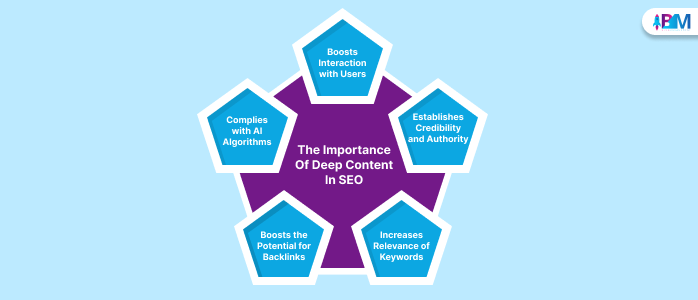Artificial intelligence (AI) was only the stuff of science fiction a few years ago; it was portrayed as a far-off future notion in novels and movies. In the present day, artificial intelligence has impacted nearly every facet of human existence.
It’s so common that the regulars at your neighborhood diner may be talking about its effects. Artificial intelligence (AI) technologies of today are changing the search engine optimization (SEO) environment; however, they are not about to replace humans.
The battle between AI and SEO is intense. Beyond the superficial facts, deep content offers a thorough, insightful analysis that captivates and educates readers. In addition to satisfying the changing requirements of search engine algorithms, this kind of content improves user experience and builds credibility and trust. So, what is deep content, and how can it help your SEO efforts? Let’s begin.
What Is Deep Content?
Deep content refers to well-considered, expertly organized, and extremely educational articles or blogs that offer in-depth discussion of a specific subject. Deep content explores the subtleties and complexity of a topic in greater detail than shallow content, which only skims the surface, providing insightful analysis and useful information.
Moreover, expert viewpoints, case studies, statistics, and thorough explanations are frequently included in this kind of content. Deep content fosters trustworthiness and fulfills the reader’s thirst for information by approaching the subject in a comprehensive way.
Such deep content is becoming more and more popular in the AI era since it helps search engines achieve their objective of providing people with the most relevant and helpful information.
Deep Content Includes:
thorough explanations of difficult subjects
insights based on data
Prominent industry figures’ statements and expert opinions
Visual components such as pictures, videos, and infographics
Regular updates to ensure that the content is up to date
The Importance Of Deep Content In SEO

Search engines like Google are becoming more adept at comprehending and assessing the quality of content in the AI era.
Updates like Google’s BERT and subsequent algorithms have made it less important to focus on keyword-stuffed pages and more on those that really provide value to users. This is how important deep content is in this new setting.
(i) Boosts Interaction With Users
Deep content engages readers by giving them useful knowledge that specifically answers their preferences and questions.
This enhanced engagement results in longer page time, fewer bounce rates, and a higher likelihood of content being shared. Moreover, search engines see these encouraging user signals as signs of high-quality content, which raises your search engine ranks.
(ii) Establishes Credibility And Authority
Producing thorough, extensive content contributes to the establishment of your website as an expert in your field. Readers are more inclined to trust your business and come back for additional information if they perceive your content to be trustworthy and helpful.
Additionally, because search engines value this authority, they will give you higher ranks, which will raise your online presence and trustworthiness even more.
(iii) Increases Relevance Of Keywords
Without using keyword stuffing, a wide variety of pertinent keywords and phrases can be naturally included in deep content.
Moreover, you can address a variety of search intents and questions by providing comprehensive coverage of a subject. This thorough keyword coverage increases the relevancy and exposure of your content in search results, which draws in more natural visitors.
(iv) Boosts The Potential For Backlinks
Influencers, bloggers, and other websites are more inclined to link to and mention in-depth, high-quality information.
These backlinks are essential to SEO because they tell search engines that your content is reliable and useful. Additionally, your content will rank better in search results the more authoritative backlinks it has, which will improve your whole SEO approach.
(v) Complies With AI Algorithms
AI-driven search engines give consumers’ actual value-adding content first priority. Deep content fits these algorithms’ requirements effectively because of its thorough coverage and in-depth insights.
By concentrating on producing in-depth content, you can make sure that your website satisfies search engines’ constantly changing requirements, preserving and enhancing your SEO performance in the age of artificial intelligence.
Strategies To Create Deep Content
Here are some of the best strategies to create deep content:
(i) Conduct Thorough Research
Begin by conducting a thorough investigation on your subject to compile any pertinent data, viewpoints, and information. You must use reliable sources, such as reports from the industry, scholarly articles, and expert interviews.
Moreover, this research foundation establishes your information as a trustworthy source by guaranteeing that it is comprehensive, accurate, and beneficial to visitors.
(ii) Use Structured Formatting
Use bullet points, numbered lists, unambiguous headers, and subheadings to arrange your text. Reader navigation and information absorption are facilitated by structured formatting.
Additionally, it enhances the hierarchy and context of the content for search engines, increasing the likelihood that your website will rank higher.
(iii) Include Media And Visuals
Use relevant visuals, such as photos, infographics, charts, and videos, to enhance your deep content. These components not only improve the content’s readability but also aid in clarifying difficult concepts.
Moreover, your SEO efforts may be strengthened by using visuals to enhance user experience, lengthen the time spent on the page, and raise the shareability of your information.
(iv) Provide Actionable Insights
Make sure the insights in your in-depth content are useful and applicable to readers. This gives the content a concrete value that increases the likelihood that it will be shared, bookmarked, and cited.
Moreover, actionable content promotes return visits and helps you gain the audience’s trust, both of which improve your SEO performance.
(v) Update Frequently
By adding new data, trends, and insights on a regular basis, you can keep your deep content current and interesting. Consistent updates tell search engines that your information is up to date, which can help you rank higher.
Furthermore, readers continue to find value in updated content, which increases its efficacy and long-term engagement.
In Summary
Deep content is an effective way to safeguard and improve your SEO strategy in the AI era. As search engine algorithms and consumer demands change, you can adapt by offering thorough, insightful, and organized content.
In addition to enhancing authority and engagement, deep content also complies with AI-driven search standards, keeping your website competitive.
Hence, use these strategies for including deep content as a part of your SEO efforts to watch your business grow significantly.
Read Also:
